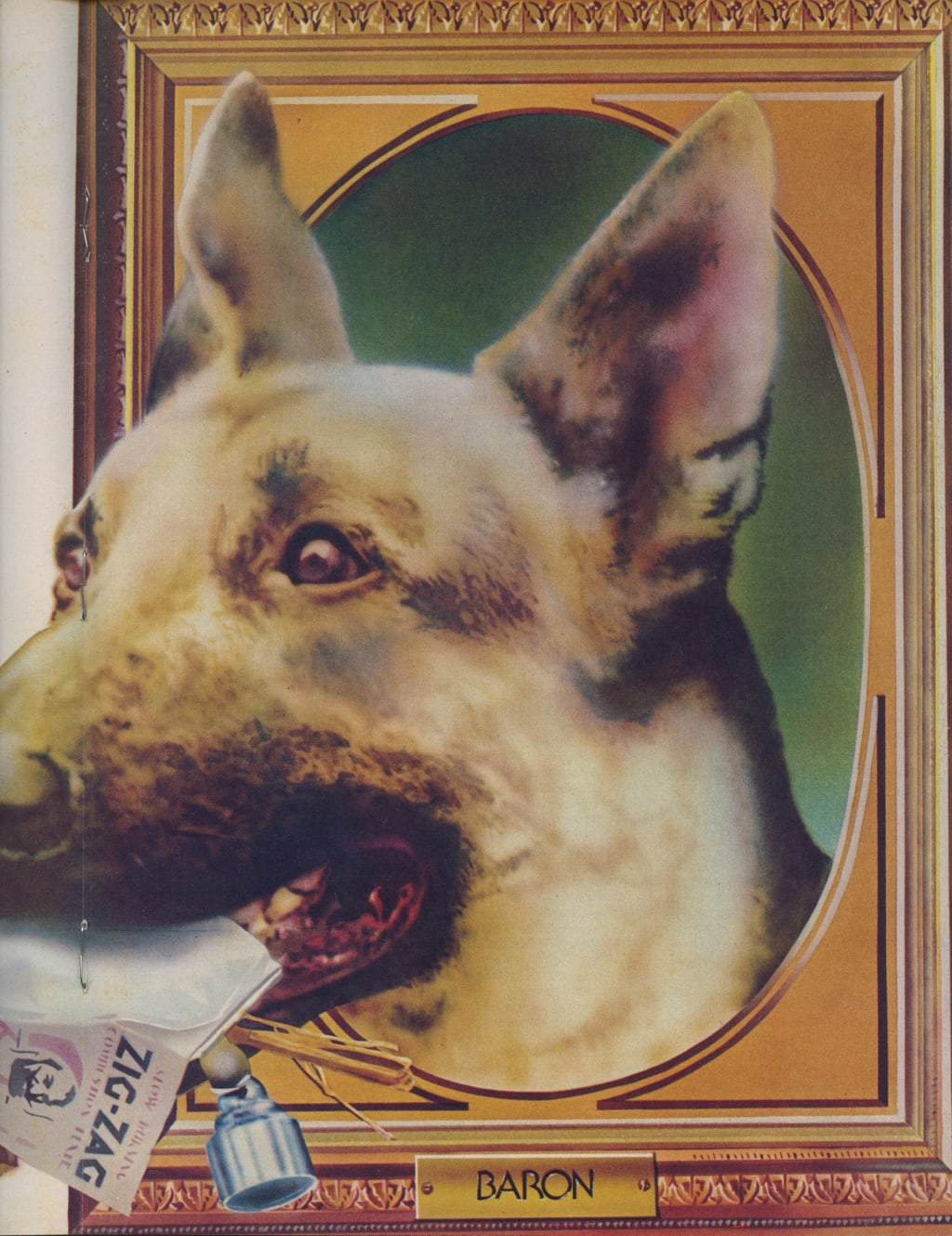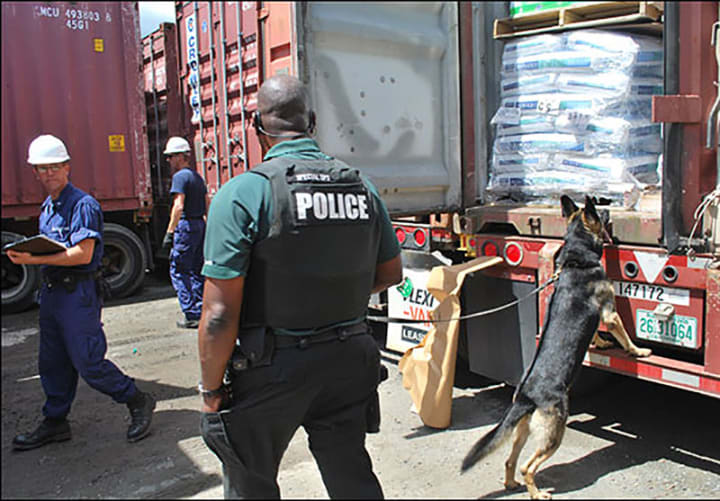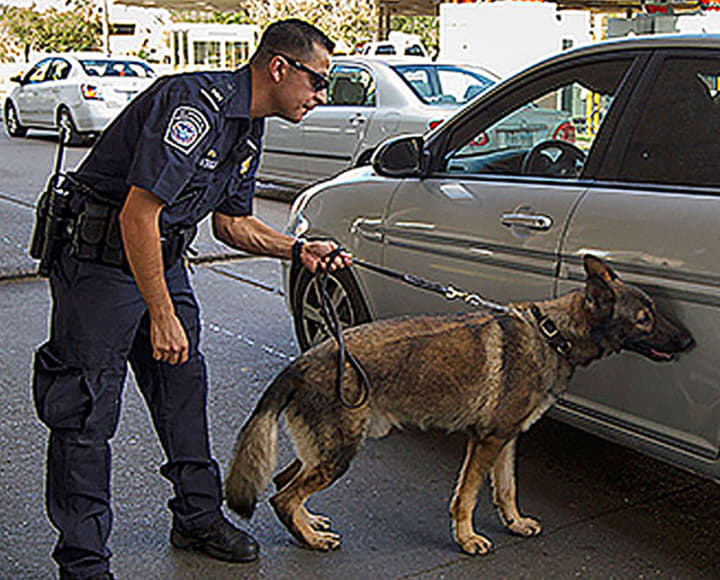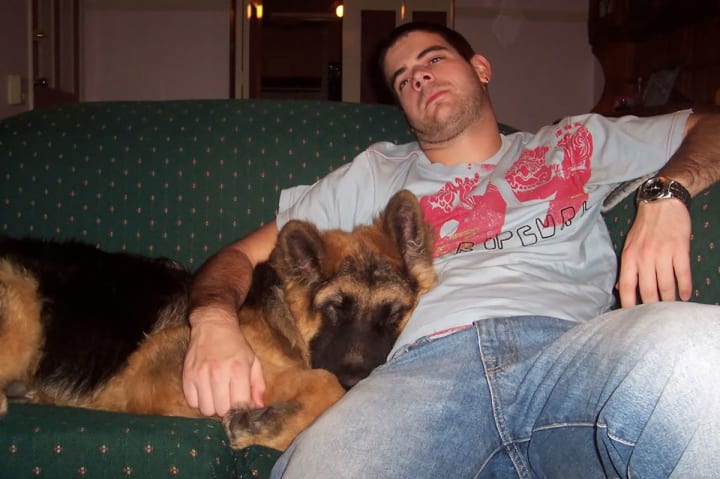How to Train a Dog to Sniff Weed
The super-smelling ability of specially trained dogs has kept hundreds of millions of dollars of marijuana off the market.

The US Customs Service has intercepted hundreds of millions of dollars of marijuana each year with the super-smelling ability of specially trained dogs, who essentially think finding weed is but a game.
Customs dog handler Harold Sniffles (not his real name, but it is what the guys in the office call him) and Duke, a German Shepherd, could not find any illegal drugs during a routine vehicle search several months ago at the Arizona border crossing. Although the Duke was not alerted to any particular part of the car, he seemed still vexed by the presence of something. As Duke became more anxious and motioned Harold toward a female passenger, the handler realized the woman might be carrying drugs in her clothing. A female officer was called. A personal search revealed 3 ounces of marijuana sealed in rubber packaging stuffed in her bra and grandma panties that seem particularly designed for filling with weed.
Man's Best Friend

Behind the guise of "man's best friend," the ranks of the canine cannabis catching corps are still on the front-lines in the labyrinthine drug enforcement bureaucracy's campaign against drugs. Unfortunately, the unwitting, highly disciplined animals are pawns of the DEA, to whom all smuggling seizures are referred. They perform a triple function of perpetuating an evil image of weed or hash, constricting local supply channels, and nudging prices upward.
But there are nowhere near enough qualified sniffers to go around. Customs officials readily admit it, and the ones in use can only work half-hour shifts at a time. For example, two dog-handler teams will work an eight hour day on an international mail conveyor belt with intervals of half-hour rest and half-hour duty. As the teams alternate, the handlers, who join a Customs inspector regularly stationed there, will scrutinize the dog's performance and attitude for signs of distraction, fatigue, or any other lapse of concentration.
Cannabis Sniffing Canine

While questions concerning limitations of the dogs' ability are dodged by officials, people connected with the cannabis sniffing canine programs will publicly acknowledge the animals can be fooled, but at the same time shower praise on bizarre instances like one where a dog surprised them with its ability to detect weed secreted in factory-sealed vegetable cans.
In a subsequent test, trainers used coffee cans opened at the side to conceal dope wrapped in a polyethylene container. They sealed the cans with epoxy, sterilized them twice, then dipped the stash in a vat of epoxy before hiding it in lockers, boxes, and mail parcels. Dogs were still able to detect the drug.
These dogs' principal function is to restrict the flow of weed and hash into the country, and the dogs are most effective only when large shipments are involved. The sheer bulk of the average marijuana shipment certainly works in the dog's favor, officials concede. As to whether the smell of either weed or hash is more readily detected than heroin or cocaine, the dog experts explain that all detection dog trainees seem to possess sufficient olfactory acuity to detect the "available odor" of heroin or cocaine. Of course the smell of those can't compare with the aggregate aroma of a large pot or hash shipment which, no matter how well concealed, is liable to leave minute traces a trained dog could detect. Since scientific research in this area is still quite scarce, a dog's general threshold for heroin or cocaine is not known. In any case, that threshold can be avoided altogether if one risks smuggling it through international passenger inspection. The dogs are not used routinely for crotch-sniffing, etc. but are available to the DEA in the event of a tip or suspicion.
Most Handlers Give More Attention to Their Canine Partners than Their Wives

Asked what they liked most about the job, virtually all of the handlers interviewed replied: working so closely with such intelligent animals. Customs sources close to the dog operation remark that some handlers relate better to their dogs than they do to humans. In fact, most handlers give more attention to their canine partners than their wives.
Summing up Customs dog psychology, a veteran trainer, said:
"Basic qualities of the dog are his desire to please his handler, and his 'self-right.' An animal on his first entry into a strange environment can't show any reaction to it. He must search it. He need not be an aggressive animal, but so well convinced that he owns the space he occupies that he doesn't worry about what is there. A dog weak in self-right will be more concerned with his safety than his job. We need a dog that is bold. A detector dog must enjoy retrieving. He must have a hard mouth... these dogs really nab the packages they find. We need a dog who can treadmill a conveyor belt in a post office. He's got to be fast and try to attack a package."
In an actual search, the handler has to be quicker than the dog in that they must prevent it from biting into a suspect package lest the receiver be forewarned by teeth marks on the parcel. Unlike human agents, these animals aren't aware of their police function.
Award Winning Weed Sniffers

As for the award winning canines, the historical superstars of weed sniffers from the 1970s and 1980s, there is Smokey, who in a joint Mexican-American effort alerted agents to 10 tons of weed hidden in hay stacks on a Mexican ranch.
- Rommel alerted inspectors to the tires of a luxury sedan that had arrived from Antwerp, Belgium. When the wheels were pulled off, 81 lbs. of hash oil were found inside heat-sealed plastic pipe—still one of the largest hash oil seizures in Customs history.
- Smack (no lie) detected 1,050 lbs. of hash hidden under a false bed of a pickup truck. While making routine checks of freight shipments in an Air India cargo shed, Smack led handler Ronald Friend to 710 lbs. of plastic-wrapped hash between the double walls of plywood boxes containing brass wall decoration plaques and teak framed mirrors.
- Smokey also sniffed out several pounds of coke sealed in 10 plastic bags inside furniture imported from Colombia.
- In February, 1973, Pepper discovered 14,680 lbs. of marijuana stowed in a ship from Mexico. No doubt skeptics would boast they could do the same with a stuffed up nose.
- Baron, another detector extraordinaire, is credited with discovering 30 Nepalese prayer rugs soaked in hash oil in a cargo bin. Dog handlers/Customs agents Fred Luby and Morris Berkowitz were checking a Pan Am cargo terminal when Baron alerted to the presence of some form of narcotic. They searched bins at waist-high levels without success. Another dog was brought in. It too reacted to the smell but couldn't trace it. Finally, after covering the entire floor area, they began to search upward and found the rugs stored 30' above the floor. Baron was presented a citation and trophy for his service to mankind by the head of the German Shepherd Dog Club. The shepherd received the honor graciously but declined to give an acceptance bark.
Dog Rehab

The dogs are not always so successful in such huge indoor areas as cargo sheds. These locations at major airports have constantly changing sets of air currents and drafts, and temperature and humidity may either enhance or diminish the dogs' ability to pick up a scent. If it is warm and/or humid, the dogs could detect cannabis substances more easily, for example. If it is exceptionally hot, handlers must be careful not to work the dog too hard lest it get overheated and lose interest or concentration.
Strangely, one of the most commonly asked questions is whether the dogs are addicted to the substances they detect. (Visions of halfway houses for dog druggies skitter through the mind.) The answer is of course, no.
Which techniques fool the dogs is the source of widespread speculation. There are too many factors affecting their smelling ability to say with any degree of certainty whether a specific camouflage technique is 100 percent foolproof. There is no scientific method of measuring nose performance. Large scale dealers and Customs officials bridle when asked how to fool the dogs. However, several medium scale smugglers have related some of their methods.
Reputed to alter dogs' senses is fox piss. While the reasons for such give rise to humorous speculation, one dealer, who no longer uses the unusual method, advised saturating a cloth in the urine of a consenting fox, then wrapping it around wax paper-wrapped weed.
According to the Information Act by the marijuana lobby, the Air Force (where the sniffer program began) acknowledged specific packaging techniques, distractor substances, and interference agents were effective in preventing detection of marijuana.
Dogs' smelling ability is said to be anywhere from 100 to 1,000,000 times better than man. The trained detectors and handler can check large or difficult locations in a small fraction of the time a Customs inspector would need for a cursory search. Fortunately, Customs is the only law agency that doesn't need probable cause to search at will. That right is generally interpreted to apply at border crossings and airports and ports of entry. Dogs used by municipal police departments are still bound largely by guidelines for obtaining a search warrant. There may be dubious comfort in the fact that there are more human enforcement agents to be fooled than dogs, but the hounding of smugglers remains all the more relentless.
About the Creator
Frank White
New Yorker in his forties. His counsel is sought by many, offered to few. Traveled the world in search of answers, but found more questions.






Comments
There are no comments for this story
Be the first to respond and start the conversation.